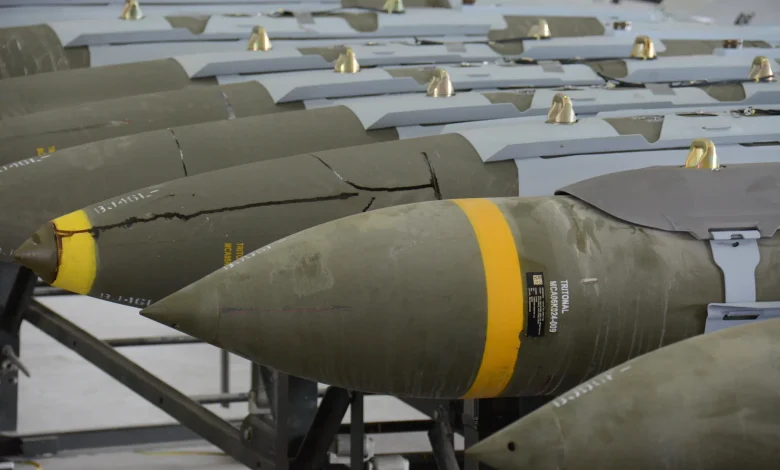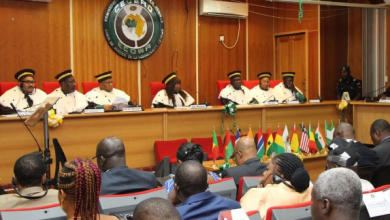Lead
U.S. approves $346m sale of ammunition to Nigeria

The United States State Department has approved a potential $346 million sale of munitions, precision bombs, and precision rockets to Nigeria.
The deal aimed to enhance Nigeria’s military capabilities in combating terrorism and illicit trafficking.
The Defence Security Cooperation Agency (DSCA) said it already delivered the required certification notifying the US Congress of the possible sale.
“The State Department has made a determination approving a possible foreign military sale to the Government of Nigeria of munitions, precision bombs, and precision rockets and related equipment for an estimated cost of $346 million.
“The Defence Security Cooperation Agency delivered the required certification notifying Congress of this possible sale on Wednesday,” a statement from the agency said.
Nigeria’s insecurity remained one of its most pressing challenges, driven by a mix of armed banditry, Boko Haram and Islamic State West Africa Province (ISWAP) insurgencies in the North-East, farmer–herder conflicts in the Middle Belt, separatist agitations in the South-East, militancy and oil theft in the Niger Delta, and rising urban crime.
These threats have led to significant loss of lives, displacement of millions, disruption of agriculture and commerce, and a heavy burden on security forces.
The federal government has responded through a multi-pronged approach. Militarily, it has launched and sustained operations such as Hadin Kai, Safe Haven, and Whirl Stroke, while increasing the deployment of troops, air power, and special forces to flashpoints.
Besides, it has invested in new military hardware, including fighter jets, drones, and armoured vehicles, and has sought closer security cooperation with neighbouring countries in the Lake Chad Basin.
On the policy front, it has strengthened border security, passed laws targeting terrorism financing, and initiated programs like the National Counter-Terrorism Strategy.
Non-kinetic efforts include community policing expansion, dialogue with some armed groups, and socio-economic interventions aimed at addressing the root causes of violence, such as unemployment and poverty.
However, persistent attacks in several regions and continued displacement indicated that while government measures have had some tactical successes, insecurity remains a deep-seated problem that required sustained, coordinated, and transparent action over the long term.
But according to the U.S. defence statement, the Government of Nigeria has requested to buy 1,002 MK-82 general purpose 500 lb bombs; 1,002 MXU-650 Air Foil Groups (AFGs) for 500 lb Paveway II GBU-12 and 515 MXU-1006 AFGs for 250 lb Paveway II GBU-58.
“(Also involved is ) 1,517 MAU-169 or MAU-209 computer control group (CCG) for Paveway II GBU-12/GBU-58; 1,002 FMU-152 joint programmable fuzes; and 5,000 Advanced Precision Kill Weapon System II (APKWS II) all-up-rounds (AURs) (consisting of one each WGU-59/B guidance section (GS); high-explosive warhead; and MK66-4 rocket motor.
“The following non-MDE items will also be included: FMU-139 joint programmable fuzes; bomb components, impulse cartridges, and high-explosive and practice rockets; integration support and test equipment,” it noted.
It also noted that the potential deal included U.S. government and contractors’ technical, engineering, and logistics personnel services as well as other related elements of logistical and programme support, the statement put the total estimated programme cost at $346 million.
The proposed sale, it said, would support the foreign policy goals and national security objectives of the United States by improving the security of a strategic partner in Sub-Saharan Africa, the US added.
Aside the proposed sale, according to the statement, will improve Nigeria’s capability to meet current and future threats through operations against terrorist organisations and to counter illicit trafficking in Nigeria and the Gulf of Guinea.
In the same vein, the U.S. stressed that Nigeria will have no difficulty absorbing these munitions into its armed forces, explaining that the proposed sale of the equipment will not alter the basic military balance in the region.
“The principal contractors will be RTX Missiles and Defense, Tucson, AZ; Lockheed Martin Corporation, Archibald, PA; and BAE Systems, Hudson, NH. At this time, the U.S.
”Government is not aware of any offset agreement proposed in connection with this potential sale. Any offset agreement will be defined in negotiations between the purchaser and the contractor,” the U.S. added.
Implementation of this proposed sale, according to the statement, will not require the assignment of any additional US government or contractor representatives to Nigeria.
“There will be no adverse impact on US defence readiness as a result of this proposed sale.
”The description and dollar value are for the highest estimated quantity and dollar value based on initial requirements.
“Actual dollar value will be lower depending on final requirements, budget authority, and signed sales agreement(s), if and when concluded. All questions regarding this proposed Foreign Military Sale should be directed to the State Department’s Under Secretary of State for Arms Control and International Security, Political-Military Affairs Outreach, at T_Outreach_PM@state.gov,” it added.



